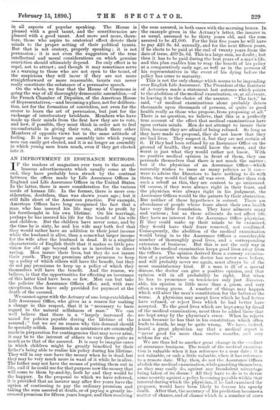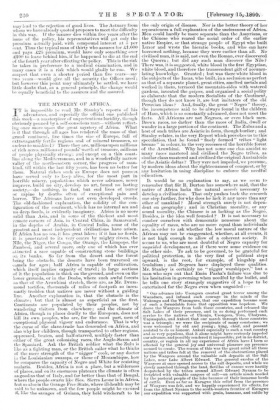AN IMPROVEMENT IN INSURANCE METHODS.
IF the readers of magazines ever turn to the miscel- laneous advertisements which usually come at the end, they have probably been struck by the contrast between the offers made by Life Assurance Offices in England and Life Assurance Offices in the United States. In the latter, there is more consideration for the various needs of human life. In the former, there is more con- sideration, doubtless, than was shown years ago ; but it still falls short of the American practice. For example, American Offices have long recognised the fact that a man who has insured his life may wish to profit by his forethought in his own lifetime. On his marriage, perhaps he has insured his life for the benefit of his wife and children. But the children have never come, and by the time he is sixty, he and his wife may both feel that they would rather have an addition to their joint income while the husband is alive, than a somewhat larger income for the wife after the husband is dead. It is a singular characteristic of English thrift that it makes so little pro- vision for old age beyond such as is involved in direct saving. Men insure their lives, but they do not insure their youth. They pay premium after premium to keep up a policy of which others will have the benefit, but they do not pay premiums to keep up a policy of which they themselves will have the benefit. And the reason, we believe, is that the opportunities for effecting an insurance of this latter kind have been so few. Men can but take the policies the Assurance Offices offer, and, with rare exceptions, these have only provided for payment at the death of the assured.
We cannot agree with the Actuary of one long-established Life Assurance Office, who gives as a reason for making a change in this respect, that it is "necessary to have regard to the natural selfishness of man." We can well believe that there is a "largely increased de- mand for policies payable during the lifetime of the assured ; " but we see no reason why this demand should be specially selfish. Inasmuch as assurances are commonly made in preparation for contingencies that may never arise, it may be to the interest of others to vary them quite as much as to that of the assured. It is easy to imagine cases in which children might be greatly benefited by their father's being able to realise his policy during his lifetime. They will in any case have the money when he is dead, but they may be very much more in want of it while he is alive. The father may not have the means of putting them out in life, and if he could use for that purpose now the money that will come to them by-and-by, both he and they would be the happier. In the proposal to which we have referred, it is provided that an insurer may after five years have the option of continuing to pay the ordinary premium and taking the sum assured at death, or of paying a greatly in- creased premium for fifteen years longer, and then receiving the sum assured, in both cases with the accruing bonus. In the example given in the Actuary's letter, the insurer is, as usual, assumed to be thirty years old, and the sum assured to be £1,000. For the first five years he will have to pay £25 8s. 441. annually, and for the next fifteen years, if he elects to be paid at the end of twenty years from the date of issue, £69 2s. 6d. This is a large sum, no doubt ; but then it has to be paid during the best years of a man's life, and this plan enables him to reap the benefit of his policy at a comparatively early age, as well as in the persons of his representatives in the event of his dying before the policy has come to maturity. This is not the only change which seems to be impending over English Life Assurance. The President of the Institute of Actuaries made a statement last autumn which points to the abolition of the medical examination, or, at all events, to leaving it to the choice of the assurer. "The fact," he said, " of medical examinations alone probably deters thousands upon thousands of persons, of quite as good health really as those who propose, from proposing at all." There is no question, we believe, that this is a perfectly true account of the effect that medical examinations have upon certain minds. Men do not attempt to insure their lives, because they are afraid of being refused. So long as they have made no proposal, they do not know that they are bad lives. They suspect it, but they are not certain of it. If they had been refused by an Insurance Office on the ground of health, they would know the worst, and the worst is just what they would rather not know. With no positive medical opinion in front of them, they can persuade themselves that there is not much the matter ; but if the physician of an Assurance Office—which naturally wishes to issue as many policies as it can— were to advise the Directors to have nothing to do with them, they would feel that all was over. Rather than risk such a rebuff as this, they are content to go uninsured. Of course, if they were always right in their fears, and the physician were always right in his judgment, the Assurance Offices would be the gainers by their abstention. But neither of these hypotheses is correct. There are abundance of people whose fears about their own health have very little foundation. They have ailments many and various ; but as these ailments do not affect life, they have no interest for the Assurance Office physician. If they could make up their minds to be examined, they would have their fears removed, not confirmed. Consequently, the abolition of the medical examination would bring in to the Assurance Offices a considerable number of thoroughly good lives, and a corresponding extension of business. But this is not the only way in which the medical examination keeps good lives away from the Offices. The opinion derived from a cursory examina- tion of a patient whom the doctor has never seen before, and will probably never see again, must always be of the most unsatisfactory kind. If a man is ill of a mortal disease, the doctor can give a positive opinion, and that opinion will in all probability be right. But when he has to pronounce on tendencies only just discover- able, his opinion is little more than a guess, and very often a wrong guess. A number of things may happen which will alter the man's constitution for the better or the worse. A physician may accept lives which he had better have refused, or reject lives which he had better have accepted. To the good lives which are kept away by dread of the medical examination, must thus be added those that are kept away by the physician's error. When he rejects a man because he has that in his constitution which often leads to death, he may be quite wrong. We have, indeed, heard a great physician say that a medical report is "never good for more than twelve months, and very seldom for six."
We are thus led to another great change in the conduct of assurance business. The result of the medical examina- tion is valuable when it has reference to a near date ; it is not valuable, or only a little valuable, when it has reference to a remote date. Why, then, do not the Assurance Offices abolish the medical examination, while guarding themselves, as they may easily do, against any fraudulent advantage being taken of its disuse ? All they have to do is to devise some security against a policy becoming payable within that interval during which the physician, if he had examined the proposer, would have been likely to foresee his speedy death. After that, the accuracy of his prediction becomes a matter of chance, and of chance which in a number of cases may lead to the rejection of good lives. The Actuary from whom we have already quoted proposes to meet the difficulty in this way. If the insurer dies within five years after the issue of the policy, his representatives will get only the premium actually paid, with compound interest at 5 per cent. Thus the typical man of thirty who assures for £1,000. and pays £25 premium, would have only something over £100 to leave behind him, if he happened to die at the end of the fourth year after effecting the policy. This is the risk he takes in preference to a medical examination, and in many cases it is a risk which would gladly be run. We suspect that even a shorter period than five years—say two years—would give all the security the Offices need ; but however this point may ultimately be settled, we have little doubt that, as a general principle, the change would be equally beneficial to the assurers and the assured.



































 Previous page
Previous page